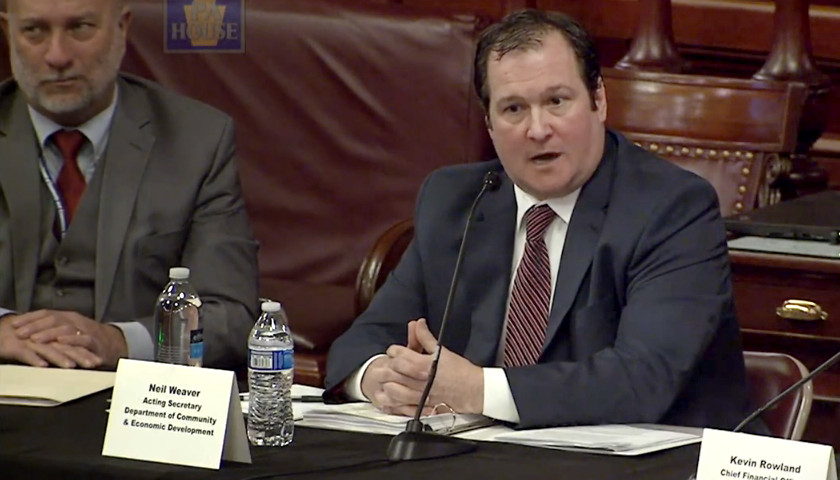At a Pennsylvania House Appropriations Committee hearing on Thursday, the panel’s GOP majority grilled the state’s chief economic-development official on the damage inflicted by COVID-related business restrictions.
In March 17, 2020, Governor Tom Wolf (D) responded to the outbreak of the novel coronavirus by ordering the shuttering of all businesses he deemed “nonessential.” The commonwealth phased out most of the closures that summer, though capacity restrictions on restaurants and other gathering places continued into 2021. Republicans in the General Assembly attempted to end the shutdowns but did not have the two-thirds supermajority needed to override the governor.
So devastating were Wolf’s actions that voters approved two amendments to the state Constitution on May 18, 2021 to prevent the executive branch from declaring such a broad and prolonged state of emergency without legislators’ approval ever again. Nonetheless, at Thursday’s hearing, lawmakers emphasized that much damage has already been done and the economy has not nearly seen a full comeback.
Representatives confronted Neil Weaver, acting secretary of Pennsylvania’s Department of Community and Economic Development (DCED), with research conducted by Johns Hopkins University concluding that mass quarantines reduced deaths by only 0.2 percent in America and Europe. They also noted that a review of the lockdowns initiated by Democratic former Auditor General Eugene DePasquale and completed by his Republican successor, Tim DeFoor, determined that Wolf’s administration applied his orders inconsistently among the state’s businesses.
Representative Greg Rothman (R-Camp Hill) reiterated concerns DeFoor expressed last September that the DCED made “questionable decisions” about which businesses it would relieve of forced closure after those entities submitted waiver requests. During the pandemic, the department was run by Weaver’s predecessor, Dennis Davin, who resigned his position last month.
“Would you like to take this time to apologize to the businesses and the people of the commonwealth who were affected by what turned out to be capricious, arbitrary and puzzling?” Rothman asked Weaver.
The acting secretary conceded that DeFoor’s report made worthy criticisms and recommendations regarding his agency, but he resisted Rothman’s request.
“We did everything that we could to keep Pennsylvania safe and our businesses safe, and we did everything that we needed to do [that was] necessary with our partners at the Department of Health,” Weaver said.
Rothman responded that Weaver’s department should have held to its central mission of aiding Pennsylvania’s economic success.
“Your job is to help businesses operate and yet you went further than federal guidelines [recommended], you went further than every other state with the exception of Michigan and you didn’t … reach out to industry groups or the legislature to talk to us about real concerns with the waiver process,” the representative said.
Earlier this week, the state’s Independent Fiscal Office (IFO) presented legislators with a report underscoring concerns about the effects of the lockdowns and capacity limits. The data showed that payroll jobs totaled just under 5.9 million last December, roughly the same number that existed in 2007. The IFO also cited projections that payroll employment will rise to about 6.05 million in December 2024, still below its high of 6.1 million reached in December 2019.
Representatives also voiced concerns about inflation, another troubling element of the IFO analysis. In January, the Consumer Price Index indicating the average year-over-year increase in prices reached 7.5 percent last month.
Nationally, as in the Keystone State, the road back to pre-COVID economic flourishing remains uphill even as hiring and earnings have taken a recent turn for the better. According to a report issued by the National Federation of Independent Business, small-business optimism this January was the lowest it had been in 10 months. The percentage of small businesses that believe now is a “good time to expand” has fallen below 10 percent, dwarfed by the nearly 25 percent who agreed with that phrase at the end of 2019.
Weaver mentioned that, in an effort to assuage difficulties wrought during the pandemic, his department oversaw the expenditure of $225 million in state aid to small businesses as well as minority-owned and women-owned entities.
Taxpayer dollars under the purview of DCED total $269.8 million for the current fiscal year. Wolf has requested that legislators enact a Fiscal Year 2022-23 departmental budget that would be about $39 million less, reflecting the modest economic recovery and the lack of new stimulus funds bestowed on the state by the federal government.
– – –
Bradley Vasoli is managing editor of The Pennsylvania Daily Star. Follow Brad on Twitter at @BVasoli. Email tips to [email protected].
Image “Nick Weaver” by Pennsylvania House Appropriations Committee.








